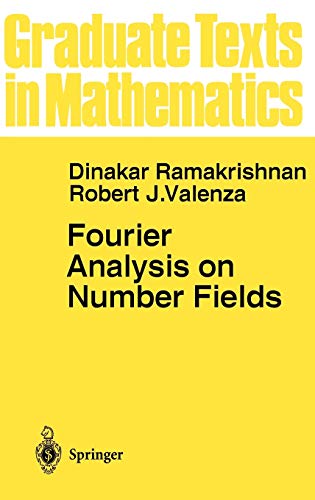

Full description not available
J**Y
Good Intro to Analytic Number Theory
I first read this book when I was a senior in undergrad, and I loved it... Granted, at the time I could really only understand the first three chapters, but it was this book that made me want to go into analytic number theory. As things turned out, I wound up going into representation theory for quantum groups... But still, the first three chapters of this book (together with the excellent exercises) are what made me fall in love with abstract harmonic analysis.As for the later chapters... There's not a whole lot of options when it comes to studying field theory from an analyst's perspective. I'm not terribly good with algebra, so I like having an exposition that's written only assuming a non-specialist's knowledge of algebra.Finally, I like how the book has a very clear goal in mind: understand Tate's thesis. The authors do a good job of summarizing why Tate's thesis is important at the beginning, and they connect back to it throughout. Learning from this book, you never stop and question, "Why do we care about this?"
S**G
An Exellent Introductory Textbook to Modern Number Theory and Automorphic Forms
I agree very much on what Stephen Miller said. This textbook is a very execellent introductory textbook to modern number theory. It does not require any particular math background besides elementary undergraduate maths so that it is suitable to new graduate students. The exercises are very nice and helpful. The level is a little bit challenging. I ever taught courses based on this book twice and both students and I benefit a lot.For the contents, the textbook provides a thourough treatment on basics of modern NT such as local fields, adeles, ideles, Fourier inverse formula etc. Moreover, I think the textbook might be the best source so far I know for on Tate's thesis as a textbook. It is a perfect starting book for readers who are interested on automorphic forms. Also, just as Miller said, it is also a good reference book to mathematicians with various background, not just merely number theorists.So I recommend this textbook strongly.Song Wang, the Morningside Center of Mathematics, AMSS, CAS, China.
D**R
one more opinion
I don't agree with the previous reviewer about the value of thisbook - I think that with several minor exceptions there is nothing in this book which could justify its publication.Of course, as it is clear to every expert, there is nothingreally new in this book; but sometimes one can rewrite oldthings in such a way that a new book is justified.With the material of this book I know much better expositionsof every chapter of it (including harmonic analysis, number theory and Tate-Iwasawa method) in other sourses.There are also some mistakes and errors (for example,the Poisson summation formula is not proven),some of which may cause the readerthink that there were mistakes on the original works.This text could have appeared online as lecture notes,but the publication of it by Springer confirm the well known fact of degradation of their mathematical series.D. Ziegler
Trustpilot
2 weeks ago
2 months ago